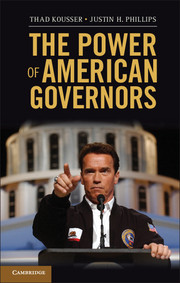Book contents
- Frontmatter
- Contents
- List of Figures
- List of Tables
- Acknowledgments
- 1 One Problem Shared by 50 Governors
- 2 The Roots of Executive Power
- 3 What Do Governors Propose?
- 4 Gubernatorial Success
- 5 Do Governors Set the Size of Government?
- 6 The Power and Perils of Popularity
- 7 The Item Veto A Negative or a Positive Power?
- 8 Legislative Professionalism and Gubernatorial Power
- 9 Governors and the Comparative Study of Chief Executives
- References
- Index
5 - Do Governors Set the Size of Government?
Published online by Cambridge University Press: 05 November 2012
- Frontmatter
- Contents
- List of Figures
- List of Tables
- Acknowledgments
- 1 One Problem Shared by 50 Governors
- 2 The Roots of Executive Power
- 3 What Do Governors Propose?
- 4 Gubernatorial Success
- 5 Do Governors Set the Size of Government?
- 6 The Power and Perils of Popularity
- 7 The Item Veto A Negative or a Positive Power?
- 8 Legislative Professionalism and Gubernatorial Power
- 9 Governors and the Comparative Study of Chief Executives
- References
- Index
Summary
How powerful are governors in negotiations over the size of the state budget? Can chief executives stand up to legislatures when it comes to deciding how much government will tax and spend? A lengthy literature in state politics suggests that the answer to this question is no. Most quantitative studies find that governors are reduced to little more than bystanders when it comes to determining the overall size of the state public sector.
Early empirical work found little to no relationship between the size of the budget and the partisanship of either the governor or the legislature, concluding that elected officials are neutral translators of economic and demographic conditions into policy (Dawson and Robinson 1963; Dye 1966; Hofferbert 1966; Winters 1976). Although more recent work has uncovered a link between party control and state budgeting, this link is conditioned by the types of issues over which the parties divide (Dye 1984; Brown 1995), the way that party control is measured (Smith 1997), and the set of state political institutions (Phillips 2008). Importantly, it only appears that it is the legislature's party that matters. State houses that are controlled by Democrats spend more, whereas Republican-run legislatures are more frugal and conservative. Yet, in all these studies, the party of the governor seems to be irrelevant to models predicting the size of state government. Can a Gov. Mitt Romney be no different than a Gov. Howard Dean? Can capturing the biggest prize in state politics really be irrelevant when it comes to setting the size of state government?
- Type
- Chapter
- Information
- The Power of American GovernorsWinning on Budgets and Losing on Policy, pp. 135 - 156Publisher: Cambridge University PressPrint publication year: 2012



